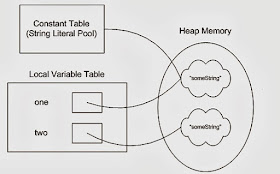Why Are Strings Immutable in Java? Insights into Memory Efficiency
Wiki Article
Unalterable Strings: A Trick Element in Ensuring Information Uniformity and Dependability
In the world of information monitoring, the significance of unalterable strings can not be overstated. These unvarying series of personalities play an essential function in promoting the stability and accuracy of details within systems. By keeping a state of immutability, information uniformity is made certain, promoting a structure of dependability upon which crucial processes count. The principle of unalterable strings goes beyond plain triviality; it is a linchpin in the complicated internet of information administration. As we discover the benefits, execution approaches, and sensible applications of unalterable strings, a clearer picture emerges of their vital nature in protecting the electronic landscape.The Concept of Unalterable Strings
Unalterable strings, an essential idea in programming, refer to strings that can not be changed when they are developed. Essentially, when a string value is designated, any kind of procedure that appears to modify the string really creates a new string. This immutability ensures information uniformity and dependability in applications, as it prevents unanticipated adjustments to the original data.
Advantages in Data Consistency

Information uniformity is critical in different aspects of software development, including database monitoring, multi-threaded settings, and dispersed systems (Why are strings immutable in Java?). Unalterable strings add substantially to accomplishing this uniformity by stopping data corruption due to simultaneous access. In circumstances where several processes or threads communicate with the same information at the same time, unalterable strings serve as a protect versus race problems and synchronization issues
Moreover, the immutability of strings simplifies debugging and testing processes. With unalterable strings, programmers can trust that as soon as a string is set, it will certainly remain unmodified, making it simpler to map the source of errors and guaranteeing that examination cases generate constant results. This dependability in data taking care of ultimately results in more stable and durable applications.
Executing Immutable Strings
Making certain the immutability of strings requires a thoughtful approach to their execution in software application growth. Once a string things is produced, one crucial technique is to make string courses in a method that stops modifications. By making strings unalterable, developers can enhance information consistency and reliability in their applications.To apply immutable strings properly, programmers ought to prefer producing new string objects instead of changing existing ones. This practice guarantees that as soon as a string is assigned a value, it can not be changed. Furthermore, any kind of operation that appears to customize the string should produce a new string with the wanted changes rather of modifying the original.
Furthermore, utilizing unalterable strings can simplify concurrency monitoring in multi-threaded environments. Considering that unalterable strings can not be altered after production, they can be safely shared among multiple threads without the danger of information corruption.
Duty in Dependability Guarantee
In software advancement, the usage of immutable strings plays an essential function in guaranteeing the integrity of information operations. Immutable strings, as soon as developed, can not be modified, making sure that the data they represent remains constant throughout the application's execution. This immutability home supplies a degree of guarantee that the data being processed will not be unintentionally changed, bring about unanticipated end results or mistakes in the system.By integrating unalterable strings right into software program style, designers can improve the dependability of their applications by lessening the dangers related to mutable information - Why are strings immutable in Java?. Unalterable strings assist in avoiding information corruption or unexpected adjustments, which can be specifically vital when handling sensitive info or when information honesty is vital
Moreover, the use of unalterable strings simplifies simultaneous handling, as numerous threads can securely gain access to and share string data without the risk of one thread modifying the material while another reads it. This facet adds significantly to the total dependability of the software system, ensuring foreseeable and constant actions in data handling operations.
Applications and System Combination
The smooth combination of immutable strings into various applications and systems is crucial for making sure durable information consistency and integrity across diverse technological settings - Why are strings immutable in Java?. Immutable strings play an important function in enhancing the stability of information exchanges and interactions within complicated navigate here software program ecological communities. By integrating unalterable strings right into applications, designers can minimize the threats connected with data meddling, unapproved alterations, and unintended alterations, thus strengthening the total safety and security pose of the systemIn the context of system combination, immutable strings serve as a foundational component for establishing secure interaction channels and helping with seamless data transfers in between various components. Their unalterable nature guarantees that information sent between systems continues to be the same and proven, decreasing the probability of inconsistencies or errors that might jeopardize the stability of the whole system. In addition, unalterable strings can boost interoperability in between disparate systems by offering a standard layout for information representation, enabling extra efficient data processing and exchange protocols throughout interconnected systems. By taking on unalterable strings in applications and system integration procedures, organizations can fortify their data facilities and maintain the dependability and consistency of their info possessions.
Conclusion
Finally, immutable strings play a critical duty in keeping information consistency and reliability in various applications and system assimilations. By making certain that strings can not be altered once created, the stability of data is maintained, minimizing the risk of mistakes and disparities. Executing unalterable strings can considerably boost the dependability of systems, ultimately causing more precise and trustworthy data handling.
Report this wiki page